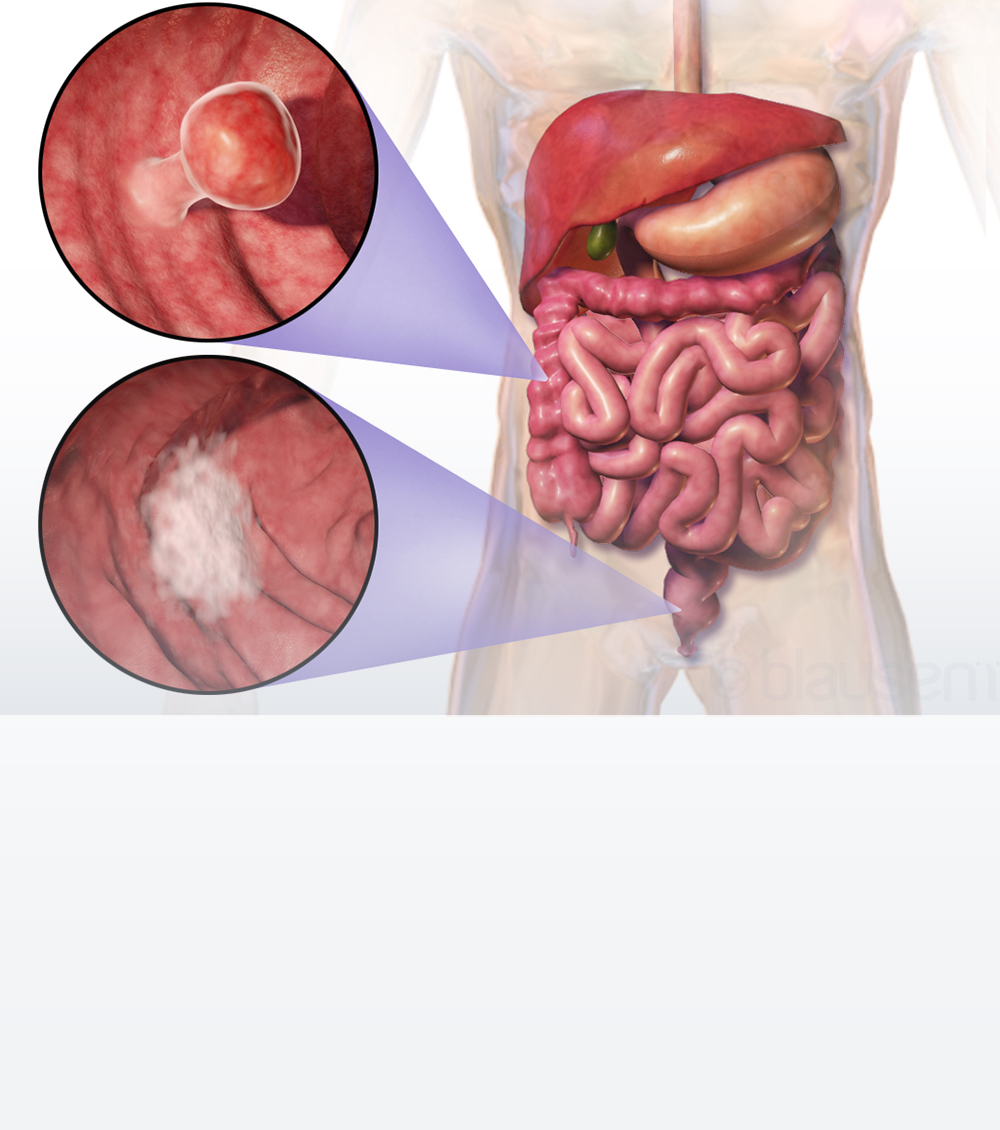Colorectal Cancer
Colorectal cancer originates in the colon or the rectum and is the second leading cause of cancer-related deaths in both men and women. Colon cancer and rectal cancer are often paired together because they share multiple similarities.
Colorectal cancer affects the digestive system or the gastrointestinal system, the colon and the rectum, together, along with muscular tube-like structures, make up the large intestine, which is 1.5 meters in length.
This type of cancer begins when the healthy cells, in the lining of the colon or the rectum, start to divide abnormally, forming a mass of cells, called a tumour. These tumours can either be malignant (or cancerous) or benign with the malignant ones spreading throughout the body.
Symptoms of Colorectal Cancer:
Patients with colorectal cancer exhibit the following signs and symptoms:
Types of Colorectal Cancer
In most cases of colorectal cancer patients, a tumour develops in the inner lining of the digestive system. These tumours are known as polyps and some of these polyps, over a while, develop into cancerous cells. The different types of polyps are:
- Adenomatous polyps or Adenoma: These polyps are precancerous conditions that tend to transform into cancerous cells and are of three types- tubular, villous or tubulovillous adenomas
- Hyperplastic polyps or inflammatory polyps: These types of polyps are usually non-cancerous. However, patients with large hyperplastic polyps of diameter more than 1 cm require periodical monitoring using colonoscopy.
- Sessile serrated polyps or traditional serrated polyps: Presence of these polyps indicates a higher risk of developing into cancerous cells.
Adenosarcomas is the most common type of colorectal cancer, which forms in the mucus-producing cells of the inner lining of the colon or rectum.
The relatively less common types of colorectal cancers include:
- Carcinoid tumours: These tumours form in the hormone-producing cells of the intestine.
- Gastrointestinal stromal tumours: These tumours form in the Cajal cells of the intestinal wall.
Other types of cancers such as Non-Hodgkin lymphoma (cancer in the immune cells, which starts in the lymph nodes of the body) or Sarcomas (cancer that initiates in the blood vessels, muscle layers or the connective tissues) can also be found in the colon or rectum and are treated in ways similar to colorectal cancer.

Diagnostics Facilities
Advanced Cancer Diagnostics
Advanced Cancer Treatment
General Diagnostic Facilities
Causes of Colorectal Cancer
Factors that increase the risk of colon cancer may include:
- Older Age: Although colon cancer can be diagnosed at any age, individuals who are above 50 years of age are at higher risk.
- Personal History: If an individual has already suffered from colorectal cancer or any form of polyps before, he or she may likely suffer from it again.
- Inflammatory intestinal conditions: Chronic inflammatory conditions such as ulcerative colitis or Crohn’s disease that affect the colon, increase the risk of having cancer.
- Inherited syndromes or genetic mutations can be passed from generation to generation that may or may not be perceptible in each individual. Although, as suggested by studies, only a small percentage of colon cancers are associated with inherited conditions, these conditions do increase the risk of cancer. The most common syndromes are familial adenomatous polyposis and Lynch syndrome or hereditary nonpolyposis cancer.
- Family history: If an immediate family member has suffered from colon cancer, increases the chances of cancer in others at later stages in life.
- Low-fibre, high-fat diet: Diet plays an important role in our health. Diets, which are high in fibre, keep our digestive system healthy. However, diets rich in fat increase health risks and alters the digestive system.
- Lifestyle choices: An inactive or sedentary lifestyle choice increases cancer risk in individuals hence it’s essential to adopt healthy and active lifestyle choices to keep the body fit and disease-free.
- Diabetes: People dealing with diabetes or insulin resistance are also at an increased risk of developing cancer.
- Obesity: Conditions of overweight and obesity increases the risk of developing cancer.
- Smoking: Smoking is associated with an increased risk of cancer.
- Alcohol Consumption: High amounts of alcohol consumption are associated with many cases of colon cancer.
- Radiation: Long exposures to radiation in the abdomen can increase a person’s risk of getting cancer.
When to see the doctor?
If you have been experiencing any of the above symptoms, we strongly recommend you visit our specialist and get tested. The symptoms may overlap with symptoms of other digestive problems and should not be ignored since they may cause trouble at later stages.

Prevention of Colorectal Cancer
Not all risk factors in colorectal cancers are preventable however, the following measures can be taken to reduce the risk of cancer:
Screening for Colorectal Cancer
Screening and diagnosis of colorectal cancer involve:
Detailed discussions about the patient’s personal and family medical history to get to know about the symptoms/diagnosis for any type of cancer or polyps.
The following tests might be performed to check for and confirm the diagnosis:
Treatment for Colorectal Cancer:
The treatment regimen given to the patient is based on several factors, like:
- Type of cancer
- Stage of cancer
- Possible side effects of treatment
- Patient’s preference
- Patient’s health and medical conditions
- Concomitant medications
- Patient’s nutritional status
The treatment options for colorectal cancer include:
- Surgery: Surgical procedures that will remove the tumour and a little of surrounding healthy tissue to get clean margins are performed by our specialists. This is known as surgical resection. It is likely that a few nearby lymph nodes will also be removed as a preventive measure.
- Laparoscopic surgery and Robotic surgery: To perform surgical resections laparoscopically/Robotic, several viewing scopes are pushed into the abdomen through small incisions. The technique is performed under anaesthesia. The recovery time is less.
- Colostomy: A colostomy is a surgical opening or a stoma, with the help of which the colon is connected to the abdomen to provide a pathway for the waste to exit the body. A colostomy bag is attached to the patient’s body where this waste is collected. A colostomy may be temporary or permanent.
- Radiofrequency ablation: Also known as, cryoablation, this technique utilizes high-energy radiofrequency waves to freeze and destroy the tumour.
- Radiation therapy: This therapy uses targeted high-energy X-ray beams to destroy cancerous cells and is commonly used in the treatment of rectal cancer since the tumour tends to recur near the area where it initially originates.

Therapies using medication: Therapies that use medications to kill cancer cells are usually called systemic therapies. In systemic therapy, the medications are given through the bloodstream to reach the cancer cells. The medicines are given either intravenously or orally and are of the following types:
- Chemotherapy: To inhibit the cancer cells from growing and dividing.
- Targeted therapy: To target the specific cancer genes and proteins that provide an environment for the growth of cancer cells.
- Immunotherapy: To boost the body’s natural defences to stop cancer.
Doctors

Dr. Deepti Mishra

Dr. Aruna Prabhu

Dr. Bhavesh Poladia


